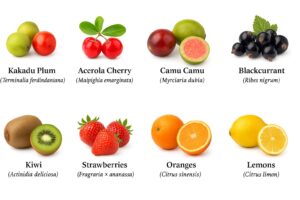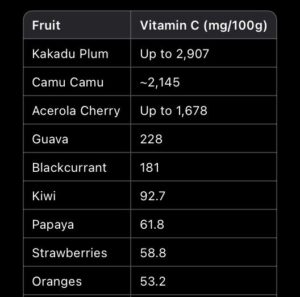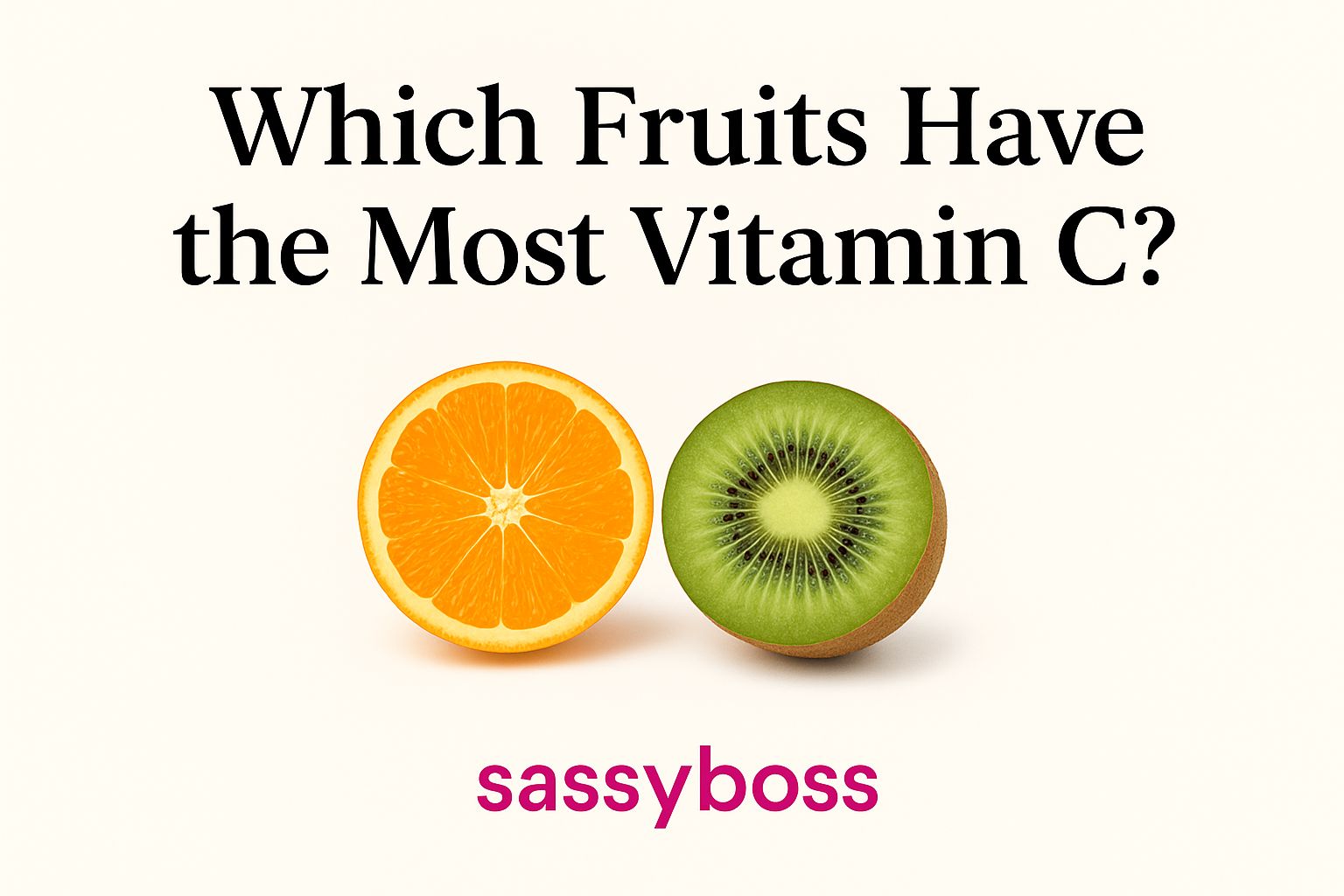🥝 Which Fruits Have the Most Vitamin C?
Ascorbic acid, also known as vitamin C, is an essential component that promotes skin health, immune system performance, and potent antioxidant activity. Although oranges are frequently linked to vitamin C, other fruits also have larger levels of this vital nutrient. The best fruits high in vitamin C, their health advantages, and useful strategies to include them in your diet will all be covered in this article.
🧬 Why Vitamin C Matters
Vitamin C plays several crucial roles in the body:
• Immune Support: Enhances the production and function of white blood cells.
• Antioxidant Protection: Neutralizes harmful free radicals, reducing oxidative stress.
• Collagen Synthesis: Essential for the formation of collagen, supporting skin, cartilage, and bone health.
• Iron Absorption: Improves the absorption of non-heme iron from plant-based foods.
• Wound Healing: Facilitates tissue repair and regeneration.
The recommended daily intake of vitamin C is 90 mg for adult men and 75 mg for adult women, with increased needs for smokers and individuals under stress.
🍊 Top Fruits Rich in Vitamin C
Based on their content per 100 grams, let’s examine the fruits that are outstanding suppliers of vitamin C:

1. Kakadu Plum (Terminalia Ferdinand Ana)
• Vitamin C Content: Up to 2,907 mg per 100g
• Overview: Native to Australia, the Kakadu plum boasts the highest recorded vitamin C concentration of any fruit.
2. Acerola Cherry (Malpighia emarginated)
• Vitamin C Content: Up to 1,678 mg per 100g
• Overview: This tropical cherry is a potent source of vitamin C, often used in supplements and juices.
3. Camu Camu (Myrciaria dubia)
• Vitamin C Content: Approximately 2,145 mg per 100g
• Overview: Found in the Amazon rainforest, camu camu is renowned for its extraordinary vitamin C content.
4. Guava (Psidium guajava)
• Vitamin C Content: 228 mg per 100g
• Overview: A tropical fruit with a sweet flavor, guava is rich in vitamin C and dietary fiber.
5. Blackcurrant (Ribes nigrum)
• Vitamin C Content: 181 mg per 100g
• Overview: These small berries are packed with antioxidants and vitamin C.
6. Kiwi (Actinidia deliciosa)
• Vitamin C Content: 92.7 mg per 100g
• Overview: Kiwi offers a tangy taste and is a great source of vitamin C, vitamin K, and dietary fiber.
7. Strawberries (Fragaria × ananassa)
• Vitamin C Content: 58.8 mg per 100g
• Overview: Beyond their delightful taste, strawberries provide a good dose of vitamin C and antioxidants.
8. Papaya (Carica papaya)
• Vitamin C Content: 61.8 mg per 100g
• Overview: Papaya is not only rich in vitamin C but also contains digestive enzymes like papain.
9. Oranges (Citrus sinensis)
• Vitamin C Content: 53.2 mg per 100g
• Overview: A widely consumed fruit, oranges are a convenient source of vitamin C.
10. Lemons (Citrus limon)
• Vitamin C Content: 53 mg per 100g
• Overview: Lemons are versatile in culinary uses and provide a substantial amount of vitamin C.
🥗 Incorporating Vitamin C-Rich Fruits into Your Diet
Here are some practical ways to enjoy these fruits:
• Smoothies: Blend guava, kiwi, and strawberries for a refreshing drink.
• Salads: Add orange or papaya slices to salads for a sweet twist.
• Snacks: Enjoy fresh berries or kiwi as a midday snack.
• Desserts: Use acerola cherry puree as a topping for yogurt or ice cream.
• Infused Water: Add lemon or orange slices to water for a vitamin C boost.
🧾 Summary Table

